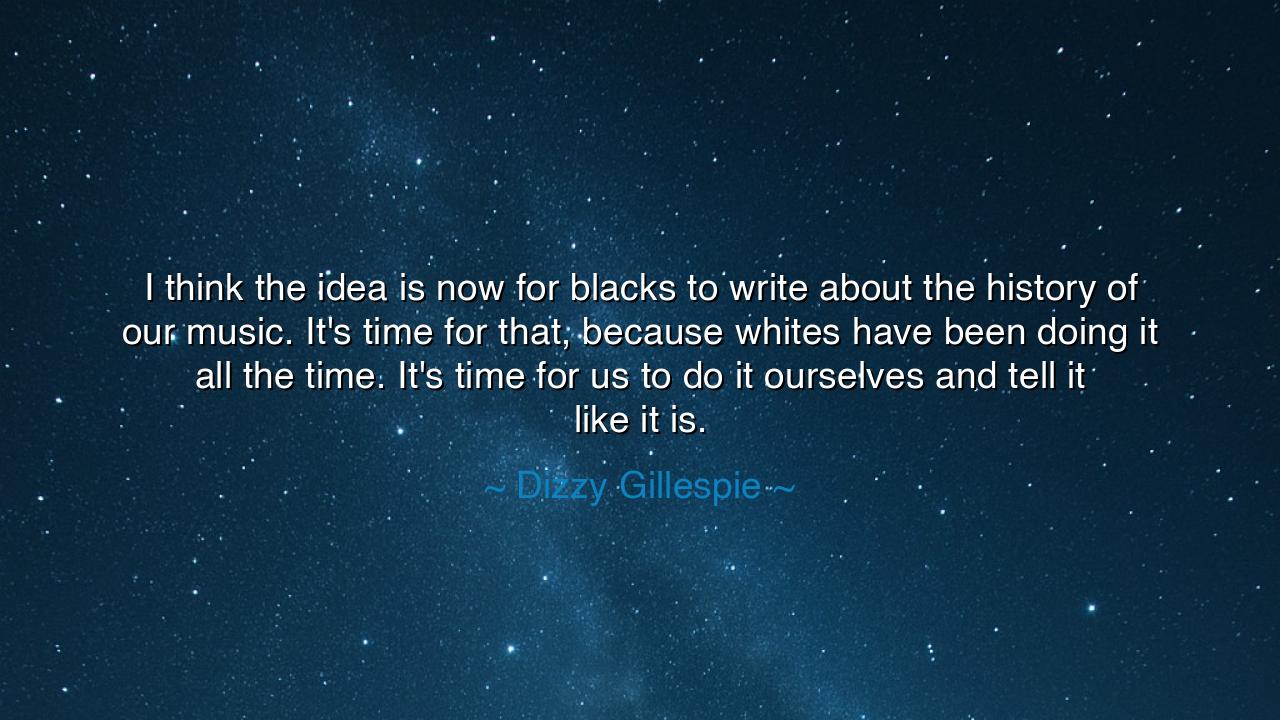
I think the idea is now for blacks to write about the history of
I think the idea is now for blacks to write about the history of our music. It's time for that, because whites have been doing it all the time. It's time for us to do it ourselves and tell it like it is.






“I think the idea is now for blacks to write about the history of our music. It’s time for that, because whites have been doing it all the time. It’s time for us to do it ourselves and tell it like it is.” — Dizzy Gillespie
Hear these words, O keepers of rhythm and seekers of truth, from the great Dizzy Gillespie, master of the trumpet and architect of bebop, who spoke not only through his music but through the wisdom of his spirit. In this declaration, he calls forth a revolution of voice — a reclaiming of history, of authorship, and of identity. He speaks of the time when the story of Black music — born from the cries of labor, the chants of faith, the pulse of jazz and blues — was written by others, filtered through eyes that could hear the sound but not always feel the soul. Gillespie’s words are a commandment to his people: “Tell it like it is.”
The origin of this quote lies in the long struggle of African American musicians to assert authorship over their own art. From the plantations of the South to the clubs of Harlem, from the sorrow songs of slavery to the swing of freedom, Black music has been the heartbeat of America — yet too often, the chroniclers of that heartbeat were not its creators. White historians, critics, and scholars documented the music, but through a distant lens. They described its form, its rhythm, its fame — but seldom its pain, its ancestry, its divine defiance. Dizzy Gillespie, who helped birth a new era of jazz that redefined sound itself, knew that the music’s true story could only be told by those who carried it in their blood.
For consider what happens when a people’s story is told by others: the melody is remembered, but the meaning fades. Jazz, the language of freedom, became for some merely an entertainment, stripped of its roots in struggle and survival. The blues, the cry of a soul wounded yet unbroken, was reduced to performance. Gillespie, with his horn raised like a prophet’s trumpet, sought to awaken a new consciousness. He understood that to control one’s narrative is to control one’s destiny — that music, history, and power are woven of the same threads.
Think of Bessie Smith, the Empress of the Blues, whose songs carried the sorrow and strength of a people. For years, her life was written about by others, her artistry explained by those who did not share her world. But when Black scholars and musicians began to tell her story anew, the truth emerged — not a tale of tragedy, but of triumph, of a woman who commanded stages and defied the boundaries set before her. This is what Gillespie meant when he said, “It’s time for us to do it ourselves.” To tell it truly is not only to correct the record, but to restore the soul that history had dulled.
The message is timeless and universal. Every people, every culture, must tell its own story — not through anger, but through authenticity. The voice of experience carries an authority that no observer can imitate. Gillespie’s wisdom reaches beyond music; it is a call to all who have been spoken for, to speak for themselves. For when the creator becomes the chronicler, history comes alive again — not as a museum of facts, but as a living rhythm that beats through generations.
And yet, his words carry not bitterness but empowerment. He does not condemn those who wrote before; he simply declares that the time has come for balance, for ownership, for truth unfiltered. The elders must write their histories, the musicians their melodies, the artists their chronicles. The pen, like the trumpet, must now be held in the hands of those who lived the music — those who know its laughter, its tears, its dance with destiny. Empathy may study it, but only experience can sing it.
So take this lesson to heart, O inheritors of art and memory: speak your own truth. Whether in music, writing, invention, or struggle, do not wait for others to define your meaning. Tell your story with courage and precision, “good, bad, and ugly,” as Gillespie’s spiritual kin Ruby Bridges once said of history. For when each person tells their own tale, humanity becomes a chorus — rich, complex, harmonious. Let your voice rise like Dizzy’s horn: bold, unashamed, and eternal. For only then will history, at last, sound as it truly was — and as it still is.






AAdministratorAdministrator
Welcome, honored guests. Please leave a comment, we will respond soon